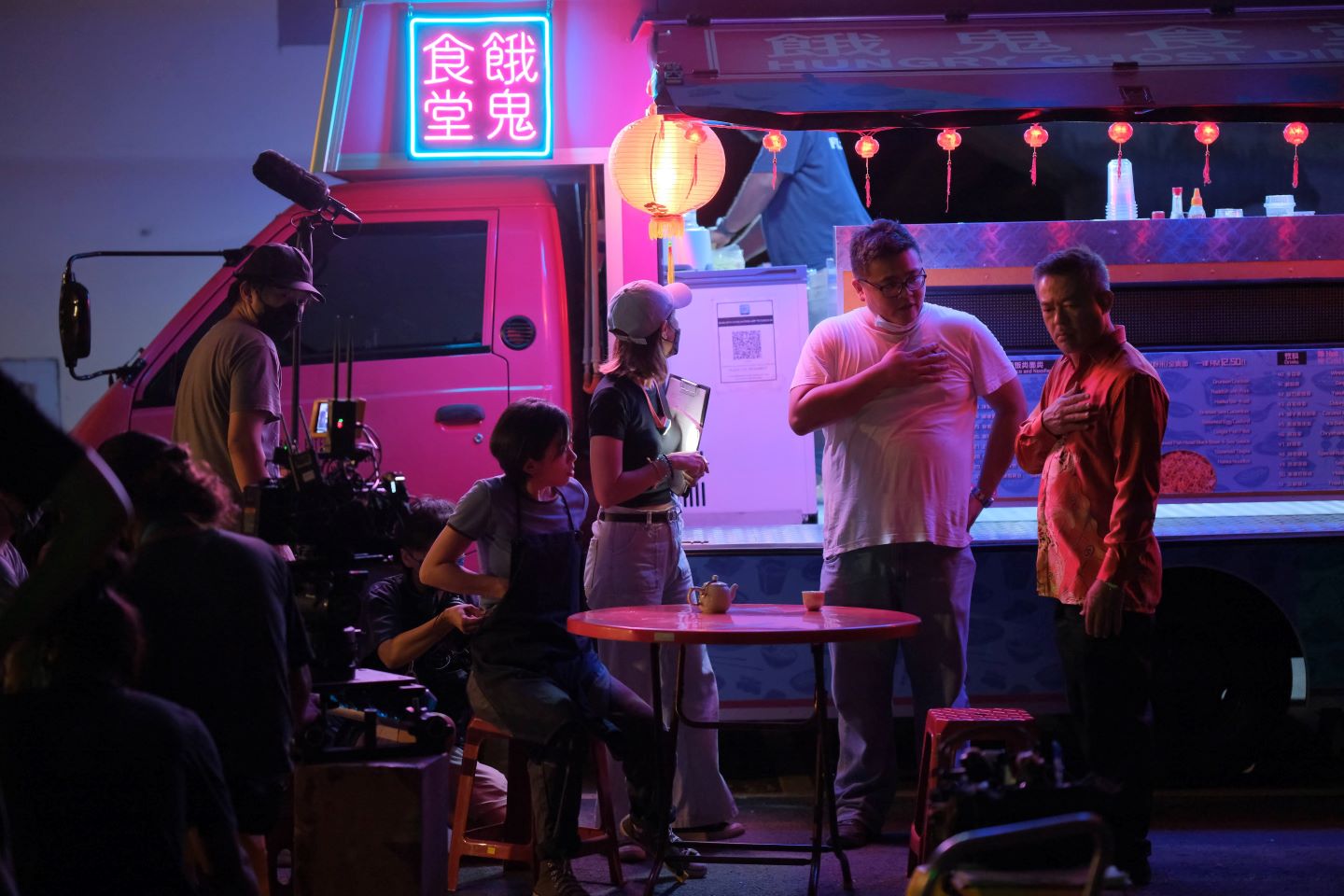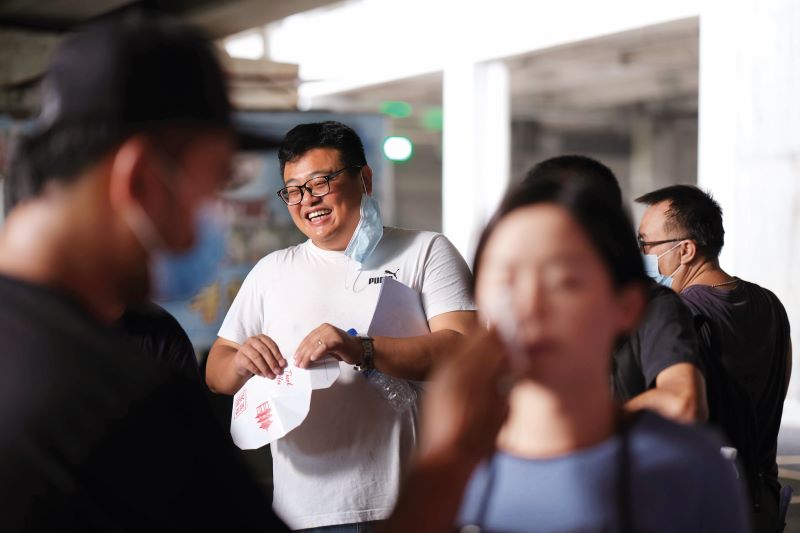
Hungry Ghost Diner received the Netpac (Network for the Promotion of Asian Cinema) Award at the 27th Bucheon International Fantastic Film Festival in South Korea (All photos: Hungry Ghost Diner)
Writer-director John Cho We Jun dislikes watching horror movies and, no, Hungry Ghost Diner is not one. Unlike vengeful, malicious beings intent on bringing harm to whomever they cross paths with, the ghosts in his film are supernatural fantasy characters akin to those from Far East Asian folklore, such as A Tale of Peonies and Lanterns, or the Hong Kong ghost franchise movies from the 1980s, Mr Vampire and Happy Ghost.
Cho’s phantom characters are just going about their business visiting loved ones and sentimental places they miss, as happens, the Chinese believe, during the Hungry Ghost Festival, observed during the seventh month of the lunar calendar. Jerry Zucker’s 1990 supernatural romance Ghost (starring Patrick Swayze and Demi Moore) comes to mind, as does fantasy comedy-drama Heart and Souls, says Cho. “I also just wanted to see more films out there that can be shared with the entire family.”
A family reunion of sorts in 2017 inspired Hungry Ghost Diner, scripted by Cho, who had been reluctant to return to Slim River, Perak, for his paternal grandmother’s funeral. He was unable to converse in Chinese, and cousins and relatives from that side of the extended family spoke little English.
But he did go, and what he expected to be an awkward affair was instead warm and kind. “I was made to feel very welcome,” he says, adding that meeting people he had not seen in a long while felt a bit like a family reunion spread across a few days.
“I was reminded that we always tend to fear what we don’t understand, and this was a theme I wanted to carry in my film.”
In Hungry Ghost Diner, Bonnie (played by singer-actress Chen Keat Yoke) experiences strange incidents after her uncle mysteriously appears at her food truck late one night. She returns to Behrang Stesen, her Perak hometown, but is stranded by a sudden lockdown. As she takes refuge in the family’s old coffee shop, Bonnie begins to encounter deceased relatives returning for the Hungry Ghost Festival.
hungry_ghost_diner_1.348.1.jpg

On July 7, Hungry Ghost Diner received the Netpac (Network for the Promotion of Asian Cinema) Award at the 27th Bucheon International Fantastic Film Festival in South Korea. It opened in Malaysian cinemas during the weekend of Aug 12, coinciding with the state elections, which no doubt had an adverse impact on the number of people interested in watching the movie that day, Cho says.
Another focus of this movie is mending ties: Bonnie is estranged from her father Bobby (played by Eric Chen). Does he hope viewers will take away something they could use to do the same in their life?
“I earnestly wanted to tell a story that was important for me, that captured my own personal desire for familial reconnection and belonging. It wasn’t my intention to make a film that delivers a message, but if people come away from it relating to the experience, then I am very glad it was able to be part of that conversation for them.”
Self-reflection also played a role in this story about reconnection. In the process, did Cho have to dig deep into himself and was that painful?
“I’m not sure if ‘painful’ is the right word. Perhaps it was difficult at first to know what were the important bits to share with the outside world. Being a filmmaker, you almost always tend to draw from a personal observation or feeling when synthesising a new work. I think it was finding the right balance between being too personal and being able to serve the story. Once you seed the film with your feelings and vulnerabilities, let the characters themselves breathe a life of their own and allow the work to evolve into something new.”
Cho, a father of two girls, has said that his aim in making movies is to entertain. Would he say a good director does that while slipping in something people can chew on?
“I’m not sure if that’s what defines a good director but, for me, even if I’m making a simple father-daughter drama like Hungry Ghost Diner, or a silly high school comedy like Die Die Top Student, I’ve always felt the need to drill down a little deeper and maybe use the opportunity to ask more serious questions about life in general.
“I use the analogy of putting ‘hidden vegetables’ — mincing up celery or broccoli and mixing it into my kids’ spaghetti sauce when they were young. Perhaps our films will lead audiences to explore more important ideas for themselves.”
Die Die Top Student is a telemovie project commissioned by Kuman Pictures and scripted by Lim Boon Siang. Cho made adjustments to the screenplay and lent it his voice in “trying to make sense of all those years as a secondary school student fearing the SPM examination, a rite of passage for every Malaysian”. Friends in their 40s tell him they still get cold sweats from bad dreams to do with having to sit the exam without sufficient prep!
dscf7555.jpg

Personally, Cho struggled throughout his undergraduate years, as he was ill-suited to the academic rigours of actuarial studies, a course his father persuaded him to pursue after noticing increasing demand for actuaries. He eventually graduated and joined the financial industry at the start of his career.
His father was also the one who introduced him to films. Growing up, he remembers dad was rarely at home because he was working at construction sites trying to make ends meet. But on weekends or public holidays, they would buy kacang putih or kacang kuda at the local cineplex before heading in to watch the latest Jackie Chan or James Bond movie.
“He is quite the avid moviegoer — a lot of my early exposure to films was through his tastes. Some of the most impressionable of these films to me were the ones we experienced together, from Batman and Indiana Jones and the Last Crusade to Once Upon a Time in China and Police Story 3.”
Their shared interest aside, it was only very much later that Cho had the courage to leave corporate employment and pursue filmmaking full time, when a short film he made in his spare time was selected for several international film festivals and opened his eyes to this different world of what his life could look like.
In his late 20s by then, he avoided the “heated protestations” he might have otherwise expected. Thankfully, too, younger sister Zen Cho — author of Sorcerer to the Crown, The True Queen and Black Water Sister — had just managed to break out as a fiction writer in the UK, so “there was a shifting attitude towards creative jobs being able to provide us with a decent living”.
But Cho’s experience of making Hungry Ghost Diner has given him no insights into how small indie film producers like him are meant to operate viably in an environment crowded with big studio releases and competition from Hollywood titles.
“To be brutally honest, I don’t see how I will be able to repeat this feat in the future, as the experience overall has been very discouraging, despite the great reviews we’ve been getting in the press and responses from audiences. We’re growing through great word of mouth, but not quickly enough to keep up with attendance numbers required to hold on to the number of screens we need to reach a nationwide audience.
“We’ll be lucky enough to hold out at one or two screens in the Klang Valley for the next couple of weeks before we disappear completely by the end of the month, when new blockbuster titles arrive,” Cho laments.
He runs Kinovisuals with his producer-partner Lim Benji, producing corporate documentaries and branded content works for corporate clientele and advertising agencies since 2013. “This is our bread and butter as we have yet to find a way to make independent films as a viable, sustainable business.”
Perhaps Cho could also take a leaf from the filmmakers he admires, among them Amir Muhammad, Liew Seng Tat, Lee Yve Vonn and Katak Chua.
“One virtue they all have in common is their ability to persevere and adapt to the ever-changing scene, that they continue to have longevity and influence in this industry. I’ve learnt from them that having a sustainable career as a filmmaker in this country is to be able to live many different lives, being able to bend in any direction the wind might blow.”
This article first appeared on Aug 28 , 2023 in The Edge Malaysia.


